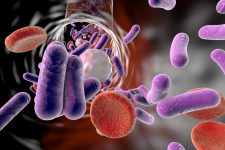 Sepsis via shutterstock
Sepsis via shutterstock
Sepsis is a serious condition in which the body’s response to an infection is overwhelming due to a dysregulated inflammatory response. The physiologic, biologic and biochemical abnormalities associated with sepsis can lead to serious injury of vital organs (multi-organ dysfunction) or death. There are over 1,665,000 cases in the United States annually and the mortality rate from sepsis can exceed 50 percent.
In a new study published in Science Translational Medicine, scientists from South Korea have developed a novel method of treating sepsis, not by focusing on the infection but by maximizing the integrity of blood vessels. The circulatory system, which is aimed at keeping tissues perfused and oxygenated, is significantly altered, accompanied by dangerously low blood pressure. The endothelium, the cellular lining of blood vessels, releases a variety of elements which cause clotting abnormalities and the subsequent leakage of fluid from the vessels into the tissues, causing edema.
The endothelial cells have a receptor known as TIE2 which, according to the authors, protects blood vessels from damage in septic conditions. However, there is another protein, angiopoietin 2 (ANG2) that blocks the actions of TIE2. These scientists have created an unusual complex that includes the antibody that essentially deactivates ANG2’s actions on the protective TIE2, and at the same time, this antibody-ANG2 is attached to a TIE2-activating antibody that promotes the protective function of TIE2. To put it simply, there is less activity of the bad protein and more activity of the good protein.
In mouse models, it was shown that this complex was highly effective in increasing survivability of mice from septic shock, by preserving the endothelial glycocalyx – a thin proteinaceous material that is key in blood vessel integrity and function. Additionally, cytokines – immune substances that promote inflammation – are reduced, as is leakage of fluid from blood vessels with subsequent reduction in damage to organs.
One of the lead authors of the study, Dr. Seung Jun Lee, a researcher at the Institute for Basic Science in Daejon, South Korea, had this to say (via Medical News Today): “In the past, treating sepsis meant fighting off the underlying infection but the immune system still attacked itself and people still died.”
Aside from ensuring the patient is breathing properly, the timely administering antibiotics and maintaining an adequate blood pressure, there is no specific treatment for sepsis, which makes this finding even more welcome. By sustaining the integrity and function of blood vessels is paramount for a variety of reasons and this antibody complex can be extended for use in the treatment of other diseases that cause leaky blood vessels such as Ebola, malaria and anthrax.



